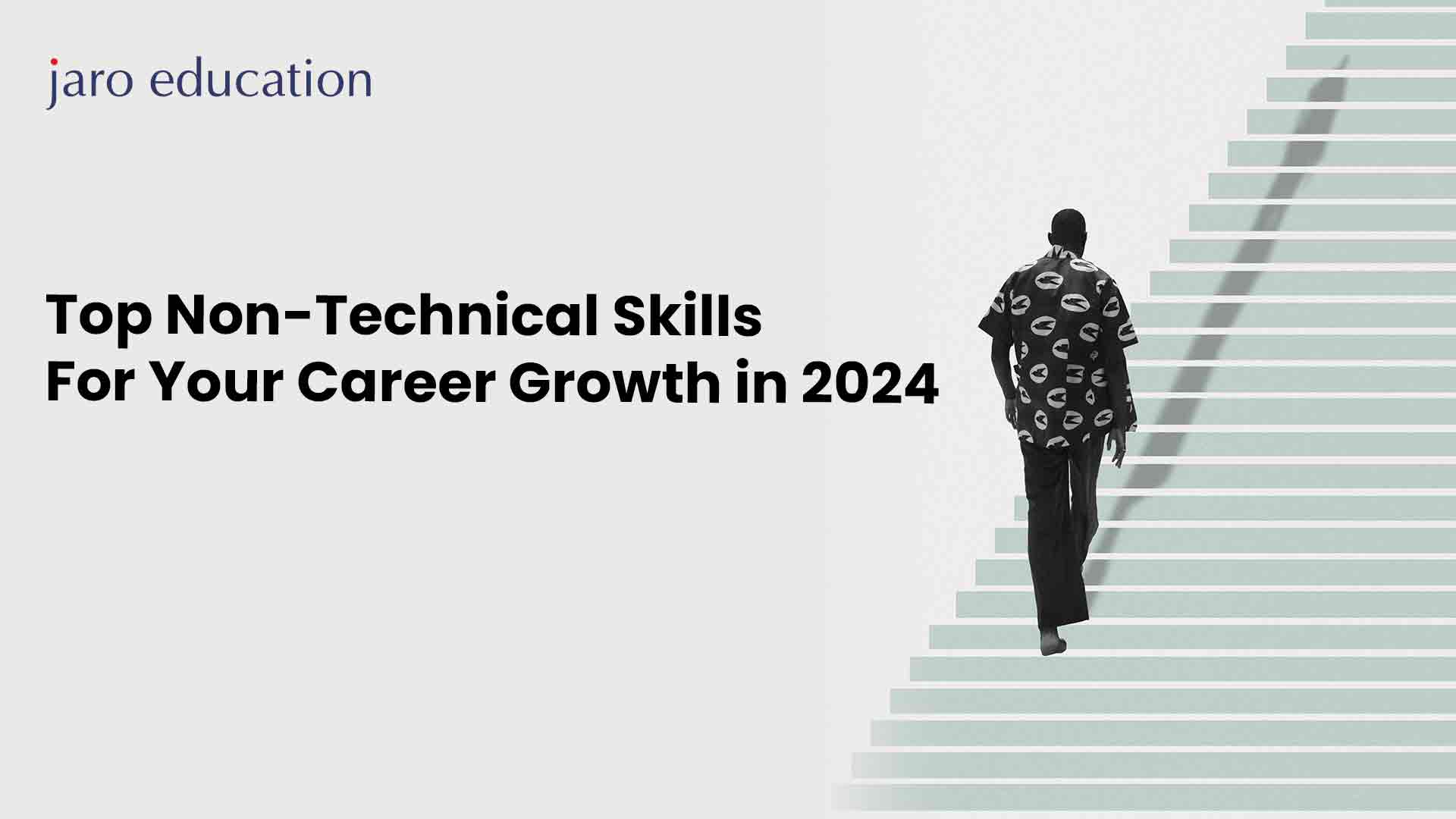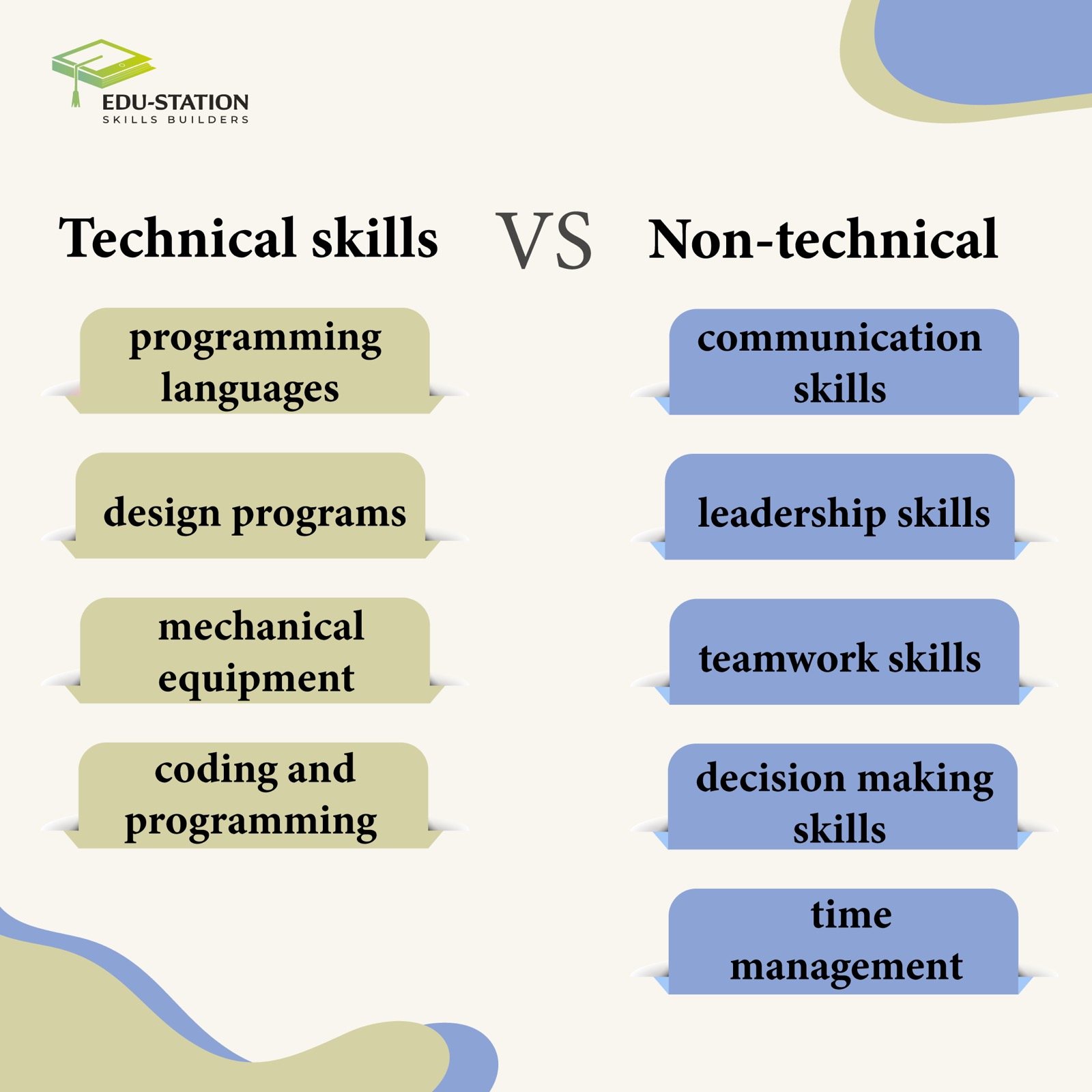
- jaro education
- 7, April 2024
- 10:00 am
Non-technical skills (NTS) constitute a crucial set of interpersonal abilities vital for success in the professional arena. These skills, including communication, leadership, teamwork, decision-making, and situation awareness, serve as catalysts that complement technical expertise rather than replace it. While technical skills are essential for specific job requirements, non-technical skills enhance the efficiency and effectiveness of individuals within their roles.
It is crucial to recognize that NTS and technical proficiency are not mutually exclusive; rather, they work in tandem. Individuals equipped with both technical expertise and robust NTS are better positioned to thrive in today’s dynamic and collaborative professional landscape. NTS act as enhancers, contributing to a well-rounded and adaptable workforce capable of meeting the
Table of Contents
challenges of the modern workplace with resilience and efficiency. This integration of NTS not only elevates individual performance but also fosters a workplace culture that values effective communication, leadership, teamwork, and adaptive decision-making—qualities essential for navigating the complexities of contemporary professional environments.
Importance of Non-Technical Skills
The significance of Non-Technical Skills (NTS) lies in their capacity to enhance workplace safety and efficiency. While these skills may seem inherent as they are employed daily to some extent, their true value becomes evident when applied adeptly. Non-technical skills are indispensable in upholding system safety and ensuring the smooth functioning of operations.
Consider the example of teamwork and communication, essential components of NTS. People routinely engage in collaborative efforts and communication in their daily tasks, but when these skills are refined through training and practice, they become invaluable assets. Highly skilled operators, acquired through training, possess exceptional NTS that enable them to work seamlessly with others and communicate effectively.
In practical terms, an operator handling an X-ray machine exemplifies the importance of NTS. By applying skills like communication and situation awareness, the operator not only works more safely but also enhances the overall efficiency of the operation. The nuanced ability to collaborate effectively, anticipate potential challenges, and communicate contributes to creating a work environment that prioritizes safety and optimizes outcomes.
In essence, non-technical skills go beyond everyday interactions; they are cultivated through intentional training and practice. These skills, when finely tuned, empower individuals to navigate complex work scenarios with heightened safety and effectiveness. The strategic application of NTS becomes a cornerstone in various professional settings, ensuring that operations are conducted with precision, minimizing risks, and fostering an environment where safety and efficiency are paramount.
Recognizing the importance of these skills, the “Post Graduate Certificate Programme in Data Science for Business Excellence and Innovation” offered by IIM Nagpur is designed to equip professionals with a blend of technical and non-technical competencies. By participating in this program, professionals can enhance their ability to drive business excellence and innovation, leveraging both their technical expertise and refined non-technical skills to navigate complex business landscapes and lead their organizations towards success.

Top 7 Non-Technical Skills in 2024
In today’s ever-changing job market, technical prowess is just one piece of the puzzle. Employers seek candidates with a diverse skill set, including these seven non-technical skills essential for success:
1. Problem-Solving Proficiency
In professional life, challenges emerge as inevitable threads, weaving their way into the fabric of everyday tasks. The ability to adeptly identify, analyze, and resolve these challenges is a hallmark of a skilled and resourceful professional.
Imagine a scenario where a project encounters unforeseen hurdles that threaten its timely completion. A candidate armed with proficient problem-solving skills doesn’t just view this as an obstacle but as an opportunity to showcase their expertise. They methodically assess the situation, identify the root causes, and strategically devise a solution that not only overcomes the immediate challenge but also contributes to the project’s overall enhancement.
On a resume, highlighting your problem-solving proficiency isn’t just a mere listing of skills; it’s a testament to your adaptability and resilience. It’s the narrative that communicates your proactive approach to challenges, showcasing your capacity not only to navigate the unpredictable terrain but to thrive amidst it.
By illustrating a specific example, such as the successful resolution of a critical project bottleneck through innovative problem-solving techniques, you provide tangible evidence of your capability to handle unforeseen challenges. This not only adds depth to your resume but also assures prospective employers that you possess the indispensable skill of turning obstacles into stepping stones for organizational success.
2. Storytelling
Storytelling stands out as a fundamental non-technical skill that goes beyond creative dimensions. It is a transformative tool for securing internal buy-in, captivating clients, and presenting effective solutions. Imagine a scenario in a corporate setting where a team member needs to propose alternative solutions to streamline processes. A professional adept in the art of storytelling can effectively communicate the challenges, the proposed solutions, and the potential positive outcomes through a compelling narrative.
For instance, a project manager tasked with improving operational workflows can use storytelling to illustrate the current state, pinpoint bottlenecks, and present a vision for enhanced efficiency. By weaving a narrative around user experiences, they make complex technical details accessible and relatable to various stakeholders.
During the hiring process, evaluating a candidate’s storytelling proficiency involves paying attention to how they articulate their past work experiences. Pose questions that delve into the stories they’ve told to convey project progress, problem-solving approaches, or collaboration successes.
3. Effective Time Management
Mastering time management stands as a key factor for successful project execution. While deadlines may not be the cherished companions of those immersed in creative pursuits, they are an indispensable force that keeps projects on track and ensures timely delivery. Deadlines, despite their often unwelcome presence, serve a crucial purpose—they prevent projects from meandering into eternity and, interestingly, spur the emergence of some of the most innovative creative work.
Consistently meeting deadlines not only showcases a commitment to punctuality but also communicates a profound respect for the client’s time, establishing trust that is paramount in professional relationships. Mastering time management is no easy feat, often requiring individuals to break free from a lifetime of ingrained habits. As such, the recruitment of staff who have already demonstrated their ability to thrive under deadlines becomes a strategic move. Directly inquiring about the tools candidates employ for time management or asking for instances when they faced and overcame a deadline challenge provides valuable insights into their approach to work.
3. Adaptability
Ability is an essential attribute that empowers individuals to gracefully manoeuvre through the ever-evolving nature of their professional environment, ensuring resilience and sustained effectiveness in their roles. The ubiquity of frequent changes across diverse industries underscores the critical significance of adaptability. It’s no longer a mere benefit; it’s a prerequisite for professionals aspiring to long-term success in their careers.
Adaptability skills transcend the act of weathering change; they define how individuals proactively tailor work plans and schedules to seamlessly align with evolving project requirements. This proactive adjustment not only showcases a readiness to embrace new challenges but also exemplifies a strategic approach to optimizing performance amid dynamic circumstances.
Consider a scenario where a project encounters unexpected shifts in scope or timeline. An adaptable professional not only remains unfazed by such changes but also contributes positively to the team’s ability to recalibrate and efficiently meet new demands.
In essence, adaptability is more than just a reaction to change; it’s a proactive and strategic approach to navigating the intricacies of the modern workplace. It goes beyond personal flexibility, influencing how individuals contribute to the overall resilience and success of their teams and organizations in an environment where change is not the exception but the rule.
Under teamwork, prioritization emerges as a crucial skill, enabling individuals to efficiently organize tasks based on their unique skills, capabilities, and areas for improvement. When collaborative efforts are in play, the mastery of prioritization becomes paramount, serving as the compass guiding the team toward the achievement of overarching business goals.
Imagine a project management team facing a tight deadline for a client presentation. Each team member possesses distinct skills—some excel in data analysis, others in creative design. To ensure the project’s success, the team collectively prioritizes tasks, leveraging the strengths of each member. The data analyst focuses on crunching numbers, the creative designer conceptualizes visuals, and the coordinator ensures seamless collaboration.
A deeper comprehension of this non-technical skill not only enhances task execution but also adds substantial value to the collective diligence of the team. The crux lies in analyzing the values inherent in each team member, unraveling a nuanced understanding of their strengths and limitations.
To elevate your proficiency in prioritization and decision-making within a team, channel your focus towards personal and collective goals. Self-motivation becomes the driving force, propelling you toward becoming an indispensable expert in your field. As you seamlessly integrate these non-technical skills into your teamwork toolkit, the collaborative landscape becomes not just an arena of tasks but a canvas where strategic excellence takes center stage.
5. Patience and Awareness
Patience and awareness are two indispensable non-technical skills that greatly influence one’s effectiveness in the workplace. Patience, the ability to remain calm and composed in challenging situations, is essential for problem-solving, collaboration, and personal growth.
This patience is not only needed when working with colleagues but also when dealing with clients. Sometimes, you have to explain technical stuff to people who might not understand it easily. That’s where non-technical skills come in handy.
On the other hand, awareness involves being mindful of one’s surroundings, actions, and their impact on others. This skill is valuable for effective communication, adaptability to change, conflict resolution, and leadership. Being aware of non-verbal cues and changes in the environment allows individuals to communicate clearly, adapt quickly, resolve conflicts peacefully, and lead their teams more effectively.
Working well with clients or people who aren’t familiar with technical things requires patience and a great level of awareness. You need to explain complex technical terms thoroughly. Getting frustrated can make things harder, so it’s important to stay patient. To navigate your work successfully without using too many technical terms, you need to clearly explain why you’re doing things. Taking the time to patiently share your ideas, without getting frustrated, helps everyone understand better. It creates a positive environment for everyone to work together smoothly.
6. Curious Mindset
In every professional community, individuals with a fervent desire to learn and adapt stand out. This curiosity acts as a driving force, propelling individuals to acquire new skills and stay informed about evolving technologies. Beyond personal development, curiosity proves to be an invaluable asset in problem-solving. For beginners, fostering a curious mindset is essential for skill enhancement and confidently addressing a range of questions to solidify knowledge.
Among seasoned professionals, choosing curiosity over judgment contributes to a collaborative work environment. Actively listening to colleagues’ ideas not only fuels curiosity but also enhances project success. Indeed, the most innovative projects often emerge from minds fueled by curiosity and a willingness to explore new concepts.
For recruiters evaluating candidates in non-technical roles, the emphasis on finding passionate learners underscores the pivotal role of curiosity in mastering contemporary skills. Cultivating a genuine interest in diverse subjects becomes the cornerstone for acquiring and honing new skills, establishing curiosity as a foundational non-technical attribute.
7. Empathy and Understanding Skills
In a corporate environment marked by constant deadlines and pressures, cultivating empathy and understanding is a vital non-technical skill that significantly impacts collaborative efforts. In such settings, where effective teamwork is crucial, creating an atmosphere that encourages team members to openly share ideas before critical decisions are imperative.
Integrating empathy into communication transforms team dynamics, creating a collaborative atmosphere where opinions are genuinely appreciated. Consider a scenario in a software development team facing a tight deadline for a project. An empathetic team member takes the initiative to understand the concerns and ideas of each colleague, creating a space for diverse perspectives. This approach not only eases tensions but also leads to innovative solutions that address various challenges efficiently.
This positive impact extends beyond internal interactions to client relationships, where understanding their perspectives becomes essential to surpass expectations and provide tailored solutions. Despite the brisk pace of the professional world, the significance of empathy should not be overlooked. This often-underestimated non-technical skill has the potential to inspire innovation, fostering ease and convenience within roles and contributing to a more harmonious work environment.
Conclusion
Boosting Non-Technical Skills (NTS) is a strategic endeavour that requires organizations to carefully evaluate operational risks and allocate resources to enhance these essential skills. The process involves recognizing the specific NTS that are crucial for different operational demands, thereby guiding targeted improvement initiatives. It’s through this focused approach that organizations can significantly enhance workplace effectiveness.
Improvement in NTS is not a one-time effort but a continuous process that involves targeted training and practice. Employees need to be aware of the signs of poor NTS and learn effective techniques for their application. This commitment to fostering a culture of ongoing enhancement is key to elevating organizational performance.
In this context, the “Post Graduate Certificate Programme in Data Science for Business Excellence and Innovation” offered by IIM Nagpur emerges as a pivotal resource for professionals aiming to refine their NTS alongside their technical skills. This course is meticulously designed to equip participants with a comprehensive skill set that comes with technical prowess in data science with the non-technical skills essential for driving business excellence and innovation. By enrolling in this course, professionals can ensure they are well-prepared to meet the complex demands of today’s business landscape, leveraging both their technical and non-technical abilities to spearhead successful initiatives and foster a culture of continuous improvement within their organizations.









